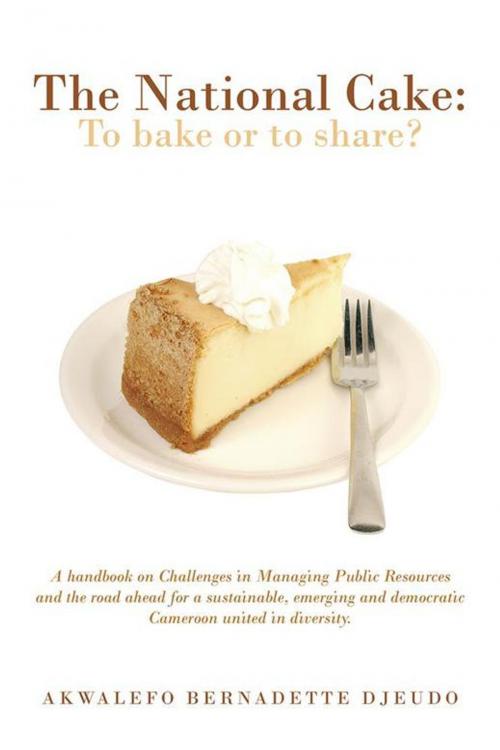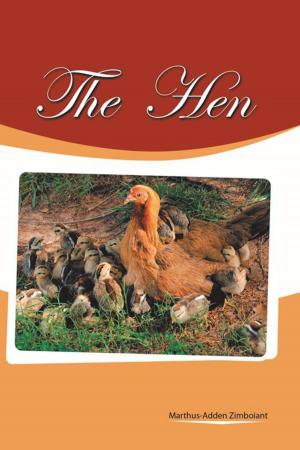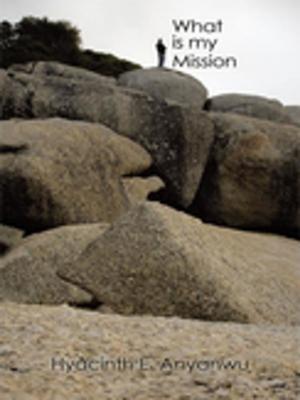The National Cake: to Bake or to Share?
A Handbook on Challenges in Managing Public Resources and the Road Ahead for a Sustainable, Emerging and Democratic Cameroon United in Diversity.
Nonfiction, Religion & Spirituality, Philosophy, Political, Social & Cultural Studies, Political Science| Author: | Akwalefo Bernadette Djeudo | ISBN: | 9781491882504 |
| Publisher: | AuthorHouse UK | Publication: | November 15, 2013 |
| Imprint: | AuthorHouse UK | Language: | English |
| Author: | Akwalefo Bernadette Djeudo |
| ISBN: | 9781491882504 |
| Publisher: | AuthorHouse UK |
| Publication: | November 15, 2013 |
| Imprint: | AuthorHouse UK |
| Language: | English |
In this book the reader is told that the unjust gap between the rich and the poor leading to social injustice in Cameroon and the world results from elite globalization and the reliance on the concept of sharing the National cake. The idea of baking the cake collectively and sharing it in an equitable manner so that everyone has a fair share is not known by the political and administrative culture. Consequently, Cameroonians spend more time talking about their share of the national cake instead of how to make the cake. The underlying principle of governance in Cameroon is best captured in the clause national cake. Call it public resources. Should the cake owned by everybody be baked or shared? Many politicians and administrators get lost amidst the intricacies of power and the grandeur that comes with it and feel that the national cake is only to be shared. They forget that they had made promises prior to their appointments and regard the civil service as an end rather than a means to an end. Money to them is the defining value and the primary mediator of relationships among persons and institutions. Ideals of equity are out the window and at the national and local levels, governments and citizens alike have become economic beggars and a consumer-nation has been created. Beggars dont create jobs; they take from those who have. Nothing paralyses a nation like citizens who lack a sense of mission for their country. In my opinion, Cameroonians should spend less time on politicking and more on constructive endeavors. They should be challenged, activated, motivated and transformed into nation buildings or bakers of the national cake that will be equitably shared. They should be builders of a sustainable, emerging and democratic Cameroon united in diversity. An emerging and sustainable nation refers to a nation that is embarked on a holistic development that can continue indefinitely into the future by properly addressing human, political, social, cultural, economic, ecological and spiritual dimensions of development. This author envisions a better quality of life for all Cameroonians through the development of a just, moral, creative, spiritual, economically vibrant, caring, diverse yet cohesive society characterized by appropriate productivity, participatory and democratic processes, and living in harmony within the limits of the carrying capacity of nature and the integrity of creation. In Part one of this book therefore, this author describes the problems affecting the process of baking and sharing the national cake in Cameroon as reflected in neopatrimonialistic and clientelistic ties. In Part two, the author carries out an assessment of the material, capital and human resources of the country, including technical personnel, and investigate the possibilities of augmenting these resources if found to be deficient in relation to the nation's requirements. This part also indicate the factors which are tending to retard economic and sustainable development, and determine the conditions which, in view of the current social and political situation, should be established for the successful execution of President Biyas major ambitions and accomplishment programme. The discussion framework in this part follows the seven dimensions of development: spiritual, human, social, cultura, political, economic and ecological. In Part three of the book, a complementary Plan to the Cameroon Vision 2035 that will lead to the most effective and balanced utilisation of the country's resources in making the national cake is formulated and the nature of the machinery which will be necessary for securing the successful implementation and financing of the plan is determined.
In this book the reader is told that the unjust gap between the rich and the poor leading to social injustice in Cameroon and the world results from elite globalization and the reliance on the concept of sharing the National cake. The idea of baking the cake collectively and sharing it in an equitable manner so that everyone has a fair share is not known by the political and administrative culture. Consequently, Cameroonians spend more time talking about their share of the national cake instead of how to make the cake. The underlying principle of governance in Cameroon is best captured in the clause national cake. Call it public resources. Should the cake owned by everybody be baked or shared? Many politicians and administrators get lost amidst the intricacies of power and the grandeur that comes with it and feel that the national cake is only to be shared. They forget that they had made promises prior to their appointments and regard the civil service as an end rather than a means to an end. Money to them is the defining value and the primary mediator of relationships among persons and institutions. Ideals of equity are out the window and at the national and local levels, governments and citizens alike have become economic beggars and a consumer-nation has been created. Beggars dont create jobs; they take from those who have. Nothing paralyses a nation like citizens who lack a sense of mission for their country. In my opinion, Cameroonians should spend less time on politicking and more on constructive endeavors. They should be challenged, activated, motivated and transformed into nation buildings or bakers of the national cake that will be equitably shared. They should be builders of a sustainable, emerging and democratic Cameroon united in diversity. An emerging and sustainable nation refers to a nation that is embarked on a holistic development that can continue indefinitely into the future by properly addressing human, political, social, cultural, economic, ecological and spiritual dimensions of development. This author envisions a better quality of life for all Cameroonians through the development of a just, moral, creative, spiritual, economically vibrant, caring, diverse yet cohesive society characterized by appropriate productivity, participatory and democratic processes, and living in harmony within the limits of the carrying capacity of nature and the integrity of creation. In Part one of this book therefore, this author describes the problems affecting the process of baking and sharing the national cake in Cameroon as reflected in neopatrimonialistic and clientelistic ties. In Part two, the author carries out an assessment of the material, capital and human resources of the country, including technical personnel, and investigate the possibilities of augmenting these resources if found to be deficient in relation to the nation's requirements. This part also indicate the factors which are tending to retard economic and sustainable development, and determine the conditions which, in view of the current social and political situation, should be established for the successful execution of President Biyas major ambitions and accomplishment programme. The discussion framework in this part follows the seven dimensions of development: spiritual, human, social, cultura, political, economic and ecological. In Part three of the book, a complementary Plan to the Cameroon Vision 2035 that will lead to the most effective and balanced utilisation of the country's resources in making the national cake is formulated and the nature of the machinery which will be necessary for securing the successful implementation and financing of the plan is determined.















